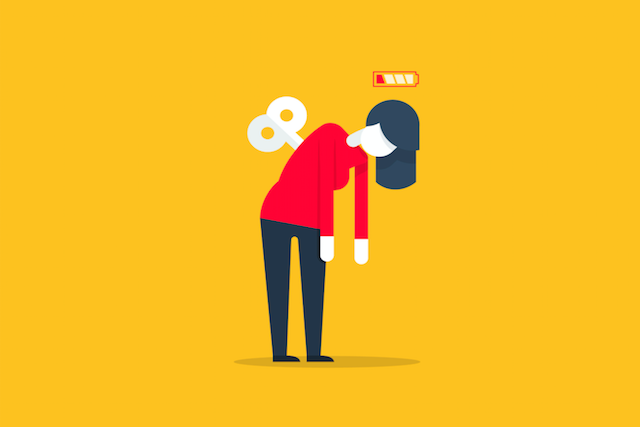
“Never get so busy making a living that you forget to make a life.” ~Unknown
I was sitting on the beach with my wonderful girlfriend, trying to relax on our vacation in Florida, yet I was racked with anxiety.
We were lying under a large umbrella, taking in the beautiful waves and swaying palm trees, attempting to recover from the past months (and years) of overwork and overstress. But all I could think about was a marketing initiative I was working on for a client.
The more I tried to chill, the more nervous I became. My girlfriend lay peacefully, dozing off occasionally, while I was busy fending off a full-blown panic attack.
Did I hurry back from our beach session to get back to work? That would be crazy, right? Well, it was worse. I pulled out my laptop and went to work right there on the beach.
I was so addicted to my computer and so stretched thin with commitments that I couldn’t even enjoy this highly anticipated vacation with the love of my life. In fact, the only thing I can remember when I look back on this trip is my stress. I don’t remember enjoying the beach or ever feeling present.
When I got back from Florida, I didn’t feel refreshed at all. I more desperately needed a vacation after it than I did before it. Not only had my over-commitment to work prevented me from enjoying my time away, it led me to operate at below my best for many months following.
Why did I do this to myself? It was a combination of things. I was insecure and using money to mask it. I was correlating my self-worth with the amount of money I had in the bank. I worked more to distract myself from my anxieties. But most of all, I was working myself to death because of how the human brain works.
The Psychology of OverWorking
The benefits of working less are counterintuitive but well documented. There are the obvious benefits—such as having more time for hobbies, friends, family, health, or even working on bigger and better projects—and then there are the less obvious benefits, such as improving creativity and productivity.
Tim Ferriss’ proposition of a “four-hour workweek” is attractive to our rational thinking brains, but in practice, it’s surprisingly difficult to work less.
The reason we work more than we need to—sometimes to the extent of actually hurting our productivity, health, or personal relationships—may lie in how humans have evolved.
In their book Why Beautiful People Have More Daughters: From Dating, Shopping, and Praying to Going to War and Becoming a Billionaire – Two Evolutionary Psychologists Explain Why We Do What We Do, Alan S. Miller and Satoshi Kanazawa postulate that our brains are shaped by evolutionary pressures to survive and reproduce. We’ve adapted to recurring problems faced by our hunter-gatherer ancestors.
“Our human nature is the cumulative product of the experience of our ancestors in the past, and it affects how we think, feel, and behave today,” Miller and Kanazawa write. People who showed no anxiety to threats would not have taken the appropriate steps to solve the problems and therefore may not have survived.
In his book Evolutionary Psychology: Neuroscience Perspectives Concerning Human Behavior and Experience, William J. Ray describes how these evolutionary adaptations can actually hinder us from properly interpreting reality:
“Consciousness is just the tip of the iceberg; most of what goes on in your mind is hidden from you. As a result, your conscious experience can mislead you into thinking that our circuitry is simpler than it really is…our modern skulls house a Stone Age mind.”
In the context of work-life balance, our brains didn’t evolve to determine exactly how much we need to work. Our brains simply want us to survive and reproduce, and working more seems to contribute to those end goals. Our brain’s anxiety about survival and reproduction motivates us to work more, even though it’s not usually in our best interest over the long term.
Similarly, our brains crave sugar because in the past, calories were scarce, and we needed to eat as much as possible to account for extended periods without food.
Sugar has a high calorie density, so it was very economical for our ancestors. As a result, many people today have a tendency to overeat unhealthy foods, even though we don’t face a problem of the scarcity of food like we did before the agricultural revolution. Unfortunately, sugar contributes to a number of health problems over the long term, but our brains don’t understand that.
Our brains think working excessively to gather resources contributes to survival and reproduction. But it doesn’t know how to moderate. More work doesn’t always lead to more money, let alone a more fulfilling life. At its worst, excessive work can lead to burnout, depression, panic attacks, and a lack of meaningful relationships.
Here are four signs you may be working to the point of your own demise:
- Working far beyond what is needed despite the risk of negative consequences
- After reaching a goal, you immediately set another more ambitious one.
- Refusing to delegate work, despite the opportunity cost of doing the work yourself
- Creating more work that doesn’t add value in order to avoid feelings of guilt, anxiety, insecurity, or depression
To be clear, there are benefits to working hard. Working more can help you get more done, and, assuming you are doing the right work, that can help you make more money. And there are times when anxiety is rational and you legitimately need to work more in order to survive. But more often than not, working too much can do more harm than good.
The counterintuitive reality is that working more does not always mean working productively if it means you’re going to burn out.
Simple But Hard Choices
We have a choice about how to deal with working too much. Like so many other challenges, there is the simple but hard solution and a complex but easy solution.
For your health, the simple but hard solution is to eat more healthy food and less unhealthy food. This solution requires discipline, but it doesn’t cost money, and it’s proven to work. The complex but easy solution is to pay for the latest diet products.
The simple but hard solution to workaholism is to work less. This means saying “no” to unnecessary projects and responsibilities. However, I call this the hard solution for a reason. First, it would be a bruise to your ego to admit you can’t handle something. Second, it requires introspection and change in order to address underlying anxieties or insecurities that may be the impetus for pathological working habits.
Fear or frustration with executing on the simple solution incentivizes us to change course. So we add complexity.
These complex but easy solutions include productivity apps, time management processes, or even prescription drugs. They can help us eke out a couple more units of productivity on a given day, but they often have negative side effects over the long term, and more notably, they enable us to avoid blaming ourselves or putting in the hard work of conquering our anxieties and insecurities.
These solutions are like playing whack-a-mole—they only solve the surface-level symptoms. James Altucher provided an apt analogy in writing about the power of saying “no” to bad opportunities:
“When you have a tiny, tiny piece of sh*t in the soup, it doesn’t matter how much more water you pour in and how many more spices you put on top. There’s sh*t in the soup.”
Often times, continuing to work excessively, even while using the latest and greatest productivity apps, only leads to burnout, which results in an extended period of low productivity or, worse, an unfulfilling life, void of meaningful relationships or even physical and mental health problems.
How to Work Less, Survive, and Prosper
Your brain doesn’t know or care that working less won’t prevent you from surviving or reproducing in modern times.
It doesn’t know how much money you have in your bank account or how many hours you need to work in order to retire in thirty years.
It definitely doesn’t care about helping you achieve higher ambitions like finding love or having fun on weekends.
You feel anxious about working less because your brain only cares about surviving and reproducing.
But we’re not slaves to our lizard brains. The idea that working less can help you accomplish more requires some critical thinking. However, with awareness of how our brains work, we can make decisions that are healthier and more productive.
So, how can you counteract your brain’s adaptive impulses? I’ll share two strategies that have worked for me.
First, know your priorities. Every time you say “yes” to more work, you’re saying “no” to the other aspects of your life that you value. By taking inventory of your list of priorities and where work lies on that list, you can make decisions that will help you live a more fulfilling life.
Second, address the underlying issues. Oftentimes we work to avoid thinking about our insecurities or shortcomings. Or, we think we need to have more money in order to be loved. I’ve been guilty of both of these.
Once I gained awareness of these issues, it was easier to make healthier decisions about my work. I worked to conquer my anxiety instead of making it worse by burying it in work, and I’ve dispelled the myth that I’m not worthy of love unless I have massive amounts of wealth.
Since doing this work, I’ve said no to many great opportunities in order to keep my life in balance. It’s difficult at the time, but I’m healthier and happier for it.
It may sound idealistic to work less, but if it can help your health, productivity, and life, isn’t it worth a shot? If it doesn’t work for you, keep in mind that there will always be more work to do!
About Mike Fishbein
Mike Fishbein is a personal development writer living in New York City. His work has been published on Entrepreneur, Business Insider, Observer and The Next Web. You can read his best articles at mfishbein.com.













 Though I run this site, it is not mine. It's ours. It's not about me. It's about us. Your stories and your wisdom are just as meaningful as mine.
Though I run this site, it is not mine. It's ours. It's not about me. It's about us. Your stories and your wisdom are just as meaningful as mine.
At 55, I have come to realize that saying “no” to the unmindfulness is not as easy for others who receive that “no” as it is for ourselves. We have control to let go that others seem to wish we didn’t and protest the change we place within ourselves in sometimes hostile ways. That I found myself talking more people off the ledge next to me than worrying about myself being on it was a wonderful recognition that it’s time to step back and take the elevator down.
There are some subtle ideas expressed here and they are simple to follow. I’ve realized that when I get burned out from pushing myself too hard,and got nothing 🙂
If you push yourself too hard sooner or later it will catch up to you. It may be difficult but sometimes you just gotta say no to things and decide to let things go. We are here to live and enjoy family and life. No one says they wish they had more time to work on thier death bed. Thanks for the info.
Nice article. Work less but with heart and more clarity.
+Take more breaks (to drink water, walk…play.. ) every hour or so.